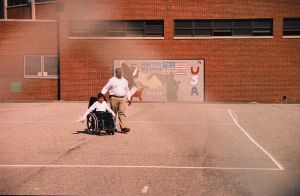
On August 6, 2012, a 33-year-old mentally disabled man, Rasheen Rose, died at a State Institution in New York . The death was ruled a homicide according to the New York Medical Examiner who concluded that Rose’s death was caused by being restrained at the Fineson Developmental Center, where Rose was living when he died, after he became unresponsive.
Rose’s sister, Shaneice Luke, brought a lawsuit in Federal Court seeking an undisclosed amount of punitive and other damages, and alleging that at least three (3) of the Fineson staff threw Rose to the ground, while one (1) sat on him and another stood by. The suit further alleges a history of abuse at the institution and failure by the supervisors to train staff properly or address the abuse.
It is not a new development that care centers for both the elderly and the disabled have been accused of abuse, failure to train staff properly, negligence, and the like as I have discussed on my website about Nursing Home Abuse . What makes this case interesting, however, is that after Luke filed her lawsuit, the State sent her a $ 11.67M bill for Medicaid assistance from August 6, 2002 through the day that Rose died on August 6, 2012.
The Office for People with Developmental Disabilities (OPWDD) of New York, the organization that oversees and runs the facility, declined to comment on why it is asking for repayment under Medicaid. It appears, however, that others families who are suing under the same or similar circumstances are also receiving similar claim notices. The OPWDD is calling this problematic, and it has been deemed as Retaliation and an Outrage to send a bill to someone who has lost a loved one due to abusive care. It is being seen as a way to punish people who bring this type of behavior and abuse to the eyes of justice, I think, it also acts a deterrent to the filing of future lawsuits of this kind.
Georgia has an office that is similar to New York’s OPWDD that is called the Office of Disability of Services Ombudsman (ODSO), and its Mission Statement is to promote the safety, well-being, and rights of individuals with disabilities and to coordinate state compliance with the 1999 US Supreme Court Olmstead decision. (O.C.G.A. §37-2-35). It is optimistic that individuals be discharged from state hospitals and, instead, are served in our communities. Nowhere in the ODSO Biennial Report does it state that in the event of death that Medicaid/Meidicare benefits be paid back, or the recipient or their loved one receive a bill for such services paid for and rendered.
Whether or not the repayments are justified as subrogation if a litigant collects in such a lawsuit, in Georgia, in New York, or in any State, such repayments must certainly not be held to be justified when a person was actually killed by her or his caregivers and clearly did not receive the type of care that comes close to any amount of money that is claimed to be due for said negligent care.
If you or a loved one has been neglected, abused, or has died in a nursing home or other care facility, then please Contact Us as soon as possible for your free consultation as we are experts at representing people in these types of Nursing Home Abuse cases, and we will protect you from unwanted harassment or retaliation for bringing your claim and seeking Justice.
We are available 24/7, and we may be reached by any of all of the following means; by phone at 770-865-8654, (813) 363-6664; by email at juliericelaw@outlook.com; on this blog site; and/or on our website.
When faced with this type of case, we have empathy with your feelings of frustration for the improper care of your loved one, and we are here to stand by your side and zealously advocate for you and your loved one’s best interests so that you or your loved one receive proper treatment, and if you or your loved one have sustained injuries or even death in these types of Nursing Home Abuse Cases, then we are here to make sure that you receive the just compensation that you deserve; and that you don’t have to pay it back.